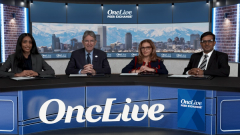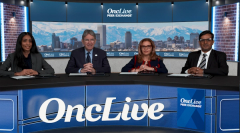
Graft-versus-Host Disease Prophylaxis and Management
Focus on methods for preventing graft-versus-host disease (GvHD) following allo-HSCT, such as pharmacologic immune suppression and stem cell graft manipulation techniques.
Episodes in this series

This is a video synopsis/summary of a Peer Exchange featuring Miguel-Angel Perales, MD; Nelli Bejanyan, MD; Amandeep Salhotra, MD; and Arpita Gandhi, MD, MS.
The panel discusses the challenges of acute and chronic graft-vs-host disease (GVHD), which remain the major cause of nonrelapse mortality in patients undergoing allogeneic hematopoietic stem cell transplantation (allo-HSCT). Acute GVHD can develop in up to 50% to 60% of patients, while chronic GVHD can be seen in up to 70% of patients, depending on factors such as HLA disparities, use of peripheral blood stem cell grafts, donor and recipient age, conditioning regimen, and graft manipulation. CD34-selected grafts have the lowest rates of chronic GVHD.
Corticosteroids remain the first-line treatment for acute GVHD, with a majority of patients responding to high-dose steroids. Ruxolitinib, an FDA-approved drug, has shown a doubling of response rates in patients with steroid-refractory acute GVHD. Patients who fail both steroids and ruxolitinib are particularly high risk, and more clinical trials are needed to improve their outcomes, potentially by focusing on prophylactic strategies and graft manipulation.
For chronic GVHD, 3 drugs have been approved: ibrutinib, belumosudil, and ruxolitinib. These drugs have shown high response rates in phase 2 studies. However, patients who fail these novel agents require combinations and off-label medications to improve their quality of life. Upcoming data on axatilimab, a monoclonal antibody targeting CSF1R, which targets monocytes and tissue-resident macrophages, may provide another option for patients who progress on other drugs. The challenge lies in sequencing and combining these drugs to improve outcomes.
Video synopsis is AI-generated and reviewed by OncLive® editorial staff.








































